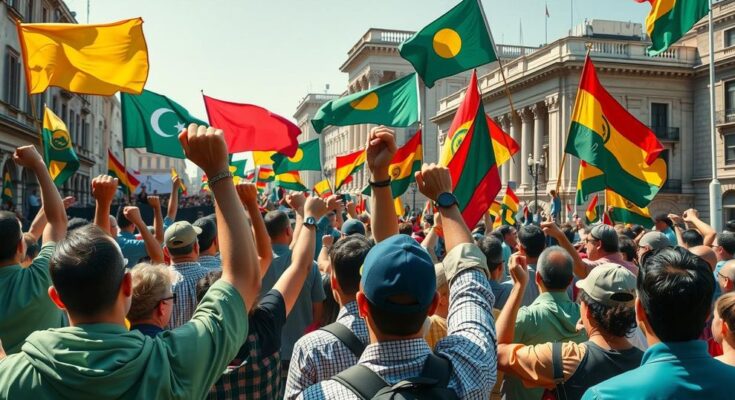Malians are increasingly protesting the military government under Colonel Assimi Goita, especially following a proposed extension of his rule to 2030. Citizens express anger over the suspension of political party activities and delays in promised elections. Concerns are mounting around rising violence and human rights abuses, particularly against civilians, with many analysts arguing that dialogue could be crucial for future stability.
In recent days, public dissent against Mali’s military government has intensified, following a controversial proposal to extend Colonel Assimi Goita’s rule until 2030. The proposal, discussed during a national conference, prompted large protests in Bamako, signifying a significant shift in public sentiment and illustrating rising frustrations with the government’s handling of political power.
Under Goita’s authority since his first coup in 2020, promises of imminent elections and a return to stability have largely fallen flat. Despite initial widespread support when he took control amid a climate of rising violence from armed groups, the situation remains dire in many parts of the country, with sporadic reports of violence, including killings attributed to government forces. Elections have been frequently postponed, leading to increased discontent among citizens.
The military government recently suspended all political party activities “until further notice for reasons of public order.” This blanket ban came just as planned mass protests were on the horizon, a move deemed as a heavy-handed response to the rising discontent. The May 3 protests, featuring hundreds of demonstrators, reflect a growing resolve among Malians to oppose the government’s attempts to consolidate power, a notion viewed as unacceptable by many.
Ousmane Diallo, a Sahel researcher at Amnesty International, noted, “For many people, even those who supported the government at first, this is a step too far. They see it as Goita trying to consolidate and hold on to power, and they have resolved to stand against it.”
There have been concerns about escalating violence, as tensions between pro-government youths and protestors heated up, nearly erupting into conflict. Past instances of government crackdowns on dissent, which have resulted in numerous fatalities, weigh heavily on the minds of many protesters. Diallo warned about the potential for backlash, especially if military factions ally with the discontented populace.
Goita rose to power during a tumultuous time in Mali’s history, claiming to tackle both national security threats and governmental corruption. His ascent was met with public approval as many were dissatisfied with the civilian government’s inability to curb the spread of armed groups wreaking havoc across the nation. However, the optimism surrounding his promise for elections has dimmed significantly after he staged a second coup last year, effectively dismissing his initial commitments.
The military government has shown no signs of returning to electoral processes. Instead, Goita’s regime has increasingly relied on hardline security measures while sidelining political opposition and limiting civic rights, leading to the arrest and persecution of dissenting voices.
Moreover, while some citizens support the government’s newfound partnerships with Russian mercenaries, who have reportedly assisted in reclaiming territories from insurgents, human rights organizations have raised alarms over reports of civilian casualties. Stricter military responses have triggered accusations of extrajudicial killings, particularly against ethnic Fulani and Dogon groups, further complicating the security dynamic.
As Mali tries to navigate the precarious situation, the country’s socio-political fabric is fraying. Reports indicate that around 3.3 million individuals have been displaced across the region due to violence, resulting in a humanitarian crisis. Proposed military solutions may be insufficient in resolving the deep-seated issues at hand, and experts argue that dialogue might be necessary to find a durable solution. Diallo expressed concerns for ordinary civilians, underscoring that intensifying military operations inevitably lead to escalating violence against them.
As tensions unfold, the future of Mali’s governance—and indeed, its very stability—remains unclear, with many citizens left fearing the prospect of further unrest in their daily lives.
The growing protests against Mali’s military government reflect deepening dissatisfaction with Colonel Goita’s regime, particularly its efforts to extend power and suppress political dissent. With the country facing significant humanitarian crises and rising violence against civilians, experts warn that a purely military approach may no longer be tenable. Dialogue might be essential to address the unrest as Malians grapple with the continuing insecurity and erosion of democratic processes.
Original Source: www.aljazeera.com




